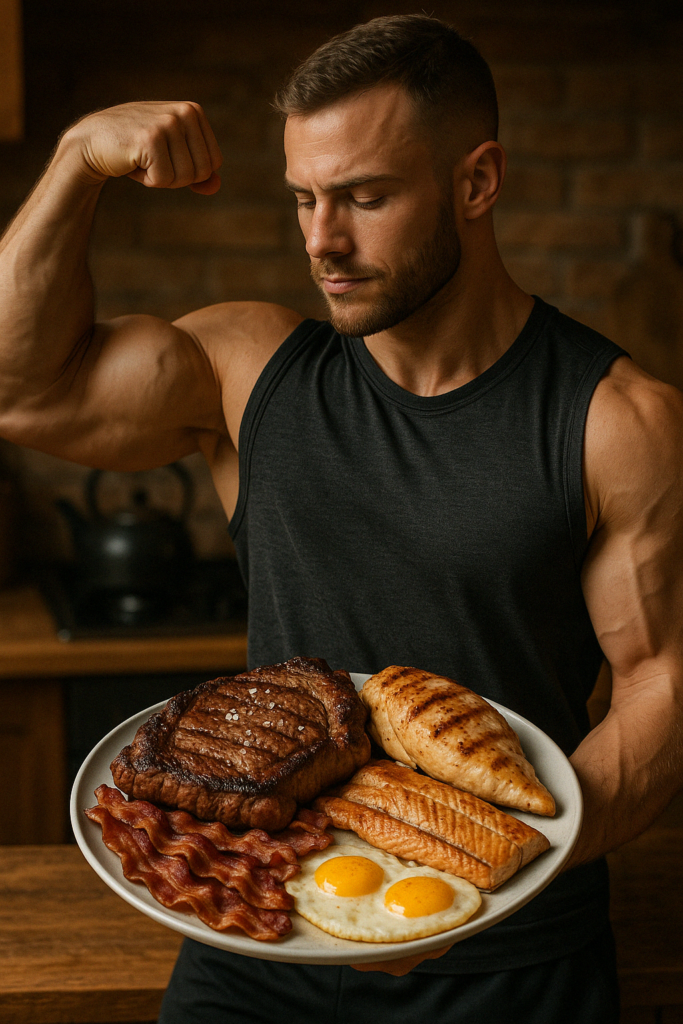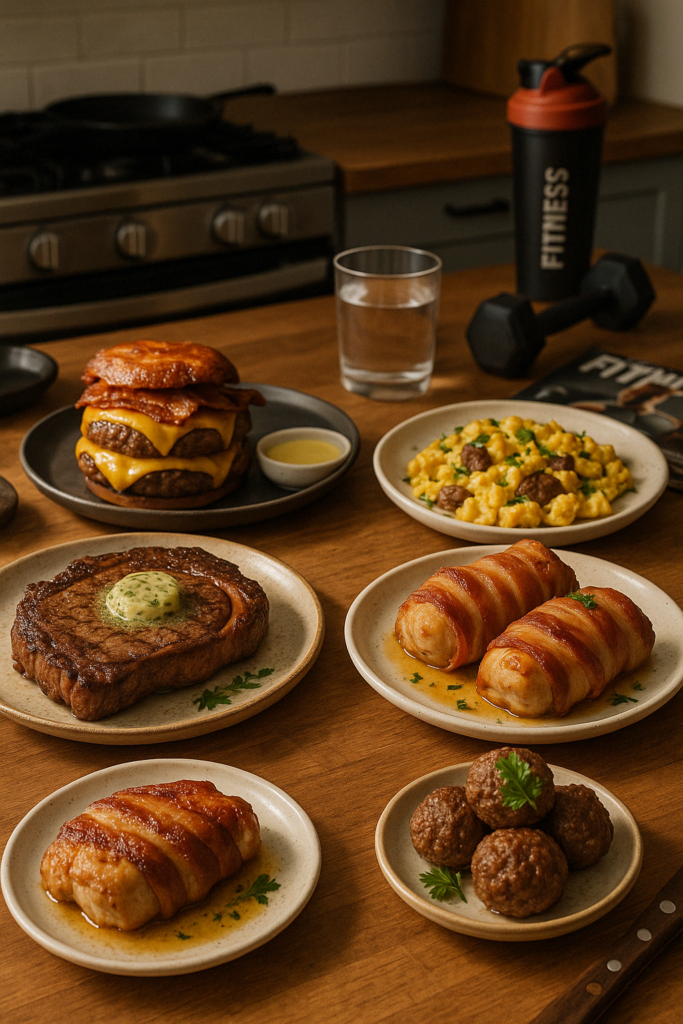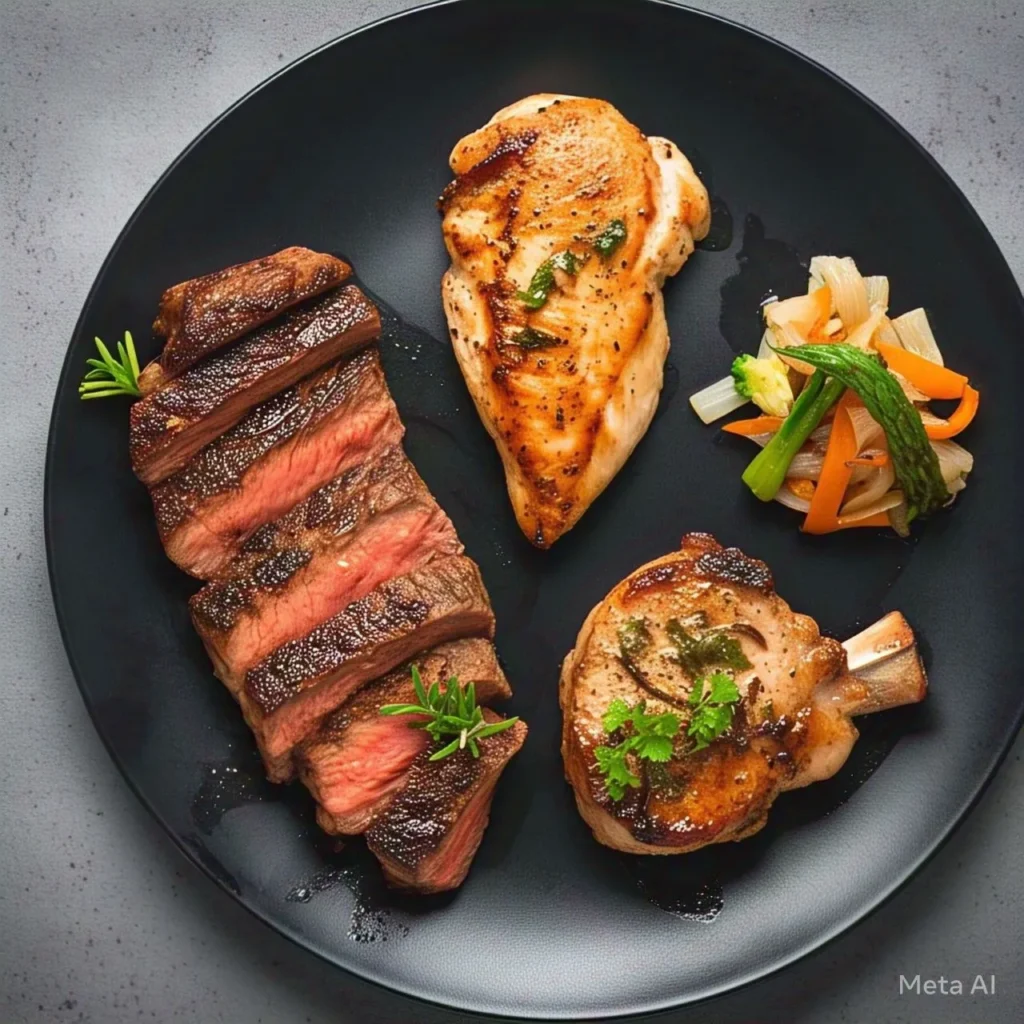The Carnivore Diet has rapidly gained popularity among those looking to shed fat and build lean muscle. This all-meat, zero-carb approach has sparked debates in the fitness and nutrition world, but the results speak for themselves. Whether you’re aiming to lose weight, gain muscle, or improve overall health, the carnivore diet offers a simple yet effective framework to help you reach your goals. By focusing solely on animal-based products—like beef, chicken, pork, and eggs—the diet ensures a high intake of protein and healthy fats, while eliminating carbohydrates entirely.
What makes the carnivore diet so appealing for weight loss and muscle gain is its ability to keep your body in a fat-burning state by utilizing protein-rich meals. Unlike typical diets that might restrict calories or focus on plant-based foods, this diet works by fueling your body with the right nutrients—lean meats, fatty cuts of beef, and organ meats. This high-protein, low-carb, and fat-friendly approach can optimize fat loss and support muscle growth in a way that few other diets can match.
For athletes and fitness enthusiasts, carnivore meals provide sustainable nutrition, supporting energy levels and facilitating recovery after workouts. Whether you’re looking to lose weight, gain muscle, or enhance overall health, incorporating meat-based meals into your diet can make a significant impact.
Why the Carnivore Diet Works for Weight Loss and Muscle Gain
What is the Carnivore Diet?
The carnivore diet is an extreme form of a low-carb, high-protein diet that consists solely of animal-based products—meat, fish, eggs, and sometimes dairy. Unlike plant-based or even paleo diets, the carnivore diet excludes all plant foods, focusing instead on nutrient-dense sources of protein and fat. The diet’s primary goal is to keep your body in a state of ketosis, where it burns fat for fuel rather than carbohydrates.
This strict, meat-centric approach may sound restrictive, but it’s grounded in solid principles. By eating only animal-based foods, you avoid the spikes in blood sugar caused by carbohydrates and refined sugars, stabilizing insulin levels and encouraging the body to burn stored fat. For those looking to lose weight while still gaining muscle, the carnivore diet offers an effective framework to achieve both goals simultaneously.
How the Carnivore Diet Helps Burn Fat
The key to fat loss on the carnivore diet is its emphasis on protein and fat. Consuming large amounts of protein supports muscle protein synthesis, a crucial process for building lean muscle and increasing metabolism. Additionally, the diet’s focus on healthy fats (such as tallow or butter) provides a steady energy source, which helps you feel full longer and reduces overall calorie intake.
Since carbohydrates are excluded, the body shifts to burning fat as its primary fuel source—a process known as ketosis. When your body enters ketosis, it efficiently breaks down fat stores for energy, leading to fat loss without the typical hunger associated with calorie restriction. This is why the carnivore diet is popular for both weight loss and muscle gain, as it encourages fat burning while supplying the body with ample protein to build lean muscle.
Muscle Growth on the Carnivore Diet
Muscle growth on the carnivore diet is primarily driven by the high intake of protein-rich meals. Consuming enough protein is essential for muscle recovery and growth, as it provides the building blocks (amino acids) that are needed to repair and build muscle tissue after workouts. Animal-based proteins, such as those found in beef, pork, eggs, and fish, contain all the essential amino acids required for optimal muscle protein synthesis.
Moreover, Vitamin B12—found in abundance in meats—plays a critical role in muscle recovery and energy production. In addition to B12, the diet provides Omega-3 fatty acids (especially from fatty cuts of fish like salmon), which help reduce inflammation and support joint health, further enhancing muscle growth. These nutrients work synergistically to ensure that the body is able to build and repair muscle efficiently, making the carnivore diet an excellent choice for anyone looking to gain muscle while simultaneously burning fat.
By fueling your body with nutrient-dense, high-protein, and low-carb meals, the carnivore diet provides all the necessary tools to lose fat, build muscle, and improve overall fitness.

Recipe 1: Grilled Ribeye Steak with Herb Butter
A juicy ribeye steak cooked to perfection and topped with herb butter is the ultimate carnivore meal. This dish is rich in protein and healthy fats, making it an excellent choice for muscle recovery and fat loss. The ribeye provides a substantial amount of saturated fats, which not only boost energy but also help your body maintain ketosis. Pairing it with a dollop of herb butter adds flavor while giving you an additional dose of healthy fats that aid in muscle building.
- Benefits: Helps repair muscle tissue, supports fat burning, and keeps you feeling full and satisfied.
Recipe 2: Ground Beef Carnivore Burgers
Ground beef is a staple on the carnivore diet, and it’s the perfect base for making quick and easy carnivore burgers. Packed with protein, these burgers are an ideal choice for post-workout nutrition, as they help replenish muscle stores and promote muscle growth. You can make them even more nutritious by adding extra egg yolks or cheese for an additional boost of protein and fats.
- Benefits: Quick, portable, and packed with essential amino acids that support muscle synthesis and recovery.
Recipe 3: Bacon-Wrapped Chicken Thighs
For those who love a bit of extra flavor and fat, these bacon-wrapped chicken thighs are a must-try. Combining chicken with bacon gives you the perfect balance of lean protein and healthy fats. This recipe is great for those who want to increase their caloric intake while staying on track with a low-carb diet. Plus, bacon adds a savory taste that makes this dish irresistible.
- Benefits: Provides a balanced source of protein and fat for energy and muscle gain, while being easy to prepare.
Recipe 4: Beef Liver and Eggs Scramble
Beef liver is often overlooked, but it’s a powerhouse of nutrients, particularly iron, Vitamin A, and protein. Pairing it with eggs in a scramble is a delicious and highly nutritious way to start your day. This meal is excellent for building lean muscle, as it supports muscle recovery with its rich nutrient profile. The iron and Vitamin A from the liver also help support red blood cell production and immune function.
- Benefits: Packed with micronutrients that support overall health, muscle repair, and growth, making it a perfect meal for athletes.
Recipe 5: Carnivore-Friendly Meatballs (Beef & Pork Mix)
Beef and pork meatballs are an easy-to-make snack or meal that combines two of the best protein sources on the carnivore diet. These meatballs are rich in protein and fat, and you can easily prepare them in bulk for meal prep. With the added benefit of being high in calories, they are a great choice for anyone looking to increase their caloric intake for muscle gain.
- Benefits: Convenient, packed with protein, and highly satisfying for anyone following a muscle-building carnivore diet.
Key Ingredients for Carnivore Diet Muscle Building Recipes
Beef, Pork, and Lamb: The Protein Powerhouses
When it comes to muscle building on the carnivore diet, beef, pork, and lamb are your go-to sources of protein. These meats are not only rich in essential amino acids but also contain saturated fats, which are needed for optimal hormone production and energy during workouts. Opting for grass-fed beef or wild game meats like venison or bison ensures that you’re getting nutrient-dense options that are free from antibiotics and hormones.
- Grass-fed beef: Higher in omega-3s and conjugated linoleic acid (CLA), which has been linked to fat loss and muscle gain.
- Pork: Offers a rich source of thiamine, zinc, and protein that helps support your body during intense training.
- Lamb: A great source of healthy fats and high-quality protein, making it perfect for muscle recovery.
Eggs and Dairy: Nutrient-Dense for Recovery
Eggs are a complete protein source, containing all the essential amino acids needed for muscle growth and repair. The egg yolks are particularly rich in fat-soluble vitamins (like Vitamin D and Vitamin A), omega-3s, and cholesterol, which are vital for hormone production and recovery. Additionally, dairy like cheese or heavy cream provides an excellent source of calcium and additional protein.
- Eggs: Perfect for a muscle-building breakfast or a protein-packed snack.
- Cheese and heavy cream: Provide extra fats and protein, making them an ideal addition to many carnivore meals for enhancing both flavor and nutrient density.
Healthy Fats: Tallow and Butter
In the carnivore diet, healthy fats are just as important as protein. Tallow (rendered beef fat) and butter (preferably grass-fed) are excellent fat sources that help you stay full, support fat burning, and optimize muscle recovery. These fats not only provide energy but also ensure that your body can efficiently absorb fat-soluble vitamins from the meat you consume.
- Tallow: Provides a high concentration of saturated fats and can be used for cooking at high temperatures.
- Butter: Rich in butyrate, which has anti-inflammatory properties and can help with gut health, making it a great addition to your carnivore meals for both flavor and health.

Meal Prep Tips for a Successful Carnivore Diet
Planning Your Carnivore Meals
Successfully following the carnivore diet relies heavily on meal planning and batch cooking. To ensure you’re getting enough protein and healthy fats throughout the week, setting up a meal plan is key. Start by designing meals that focus on protein-packed options such as steak, ground beef, chicken thighs, and fish. Add in some eggs and cheese for variety, as they’re excellent sources of protein and healthy fats.
Batch cooking is a time-saver that also ensures you always have carnivore-friendly meals on hand. Consider grilling a few cuts of beef, roasting whole chickens, or boiling dozens of eggs at once. These meals can be stored in the fridge or freezer and used throughout the week. Pre-cooked meals also make it easier to stay on track, especially when you’re hungry or pressed for time.
- Meal Prep Tip: Prepare large cuts of meat (like brisket, roast beef, or pork shoulders) in advance, so you have ready-to-eat meals all week long. Add hard-boiled eggs and pre-cooked bacon for quick snacks or breakfast options.
The Importance of Nutrient Timing
When it comes to muscle gain, the timing of your meals can make a difference. Nutrient timing refers to the idea of eating the right foods at the right times to optimize muscle growth and recovery. One of the most critical times to fuel your body is post-workout.
After an intense workout, your muscles need protein to repair and grow. A protein-rich meal within an hour after exercise, such as a ground beef burger or steak and eggs, is essential for muscle protein synthesis. This is when your muscles are most receptive to nutrients, so getting protein in right after exercise helps maximize muscle recovery and growth.
Additionally, try to maintain a high-protein intake throughout the day to support consistent muscle growth. This could mean eating multiple protein-rich meals or snacks like meatballs, grilled chicken, or liver—ensuring your body has a steady supply of amino acids.
- Nutrient Timing Tip: Eat your largest protein-rich meal after your workout to ensure maximum muscle recovery. Include fat with your meals as well to ensure a sustained energy release.
Staying on Track with the Carnivore Diet
Staying on track with the carnivore diet can be challenging, especially when it comes to food boredom or cravings. But with a little planning and creativity, you can stay motivated and enjoy your meals. One way to keep things interesting is to experiment with different cuts of meat. Try beef heart, tongue, or even wild game meats like venison or bison. These meats not only add variety but also offer different nutrient profiles that can keep your meals exciting and fulfilling.
Another tip is to make sure your meals are well-seasoned and full of flavor. While the carnivore diet focuses primarily on meat, adding herbs, spices, or even high-quality salts like Himalayan salt can make meals more enjoyable.
Lastly, if you’re struggling with cravings, make sure you’re consuming enough healthy fats (like butter, tallow, or lard). Fats help you stay full and satisfied, reducing the temptation to snack on non-carnivore foods.
- Stay on Track Tip: Keep your meals flavorful and varied with different cuts of meat and try new recipes to prevent monotony. If cravings hit, increase your fat intake to curb hunger.
Common Mistakes to Avoid on the Carnivore Diet
Not Getting Enough Fat
One common mistake people make when transitioning to the carnivore diet is focusing too much on lean meats and neglecting healthy fats. While it’s essential to get enough protein for muscle building, fats are equally important, especially on a low-carb diet like carnivore. Healthy fats not only provide energy but also support the absorption of fat-soluble vitamins like Vitamin A, D, E, and K.
If you’re eating too many lean cuts of meat (like chicken breast or lean beef), you may not be getting enough calories or nutrients to support both muscle gain and fat loss. Make sure to incorporate fatty cuts of meat like ribeye, lamb chops, and pork belly, and don’t shy away from using tallow, butter, or bone marrow to add flavor and extra fat to your meals.
- Mistake to Avoid: Don’t skimp on fat. Make sure you’re consuming fatty cuts of meat or adding cooking fats like butter and tallow.
Skipping Organ Meats
Organ meats such as liver, kidneys, and heart are often overlooked, but they’re some of the most nutrient-dense foods you can eat on the carnivore diet. Liver, in particular, is packed with iron, Vitamin A, Vitamin B12, and other vital nutrients that help support muscle recovery, immune function, and overall health.
Incorporating organ meats into your carnivore diet ensures you’re getting the full spectrum of nutrients that are often missing from muscle-building diets that focus only on muscle meat. If you’re new to organ meats, start slow by adding small amounts to your regular meals.
- Mistake to Avoid: Don’t skip the organ meats—incorporating liver and other organs will improve your nutrition and overall health on the carnivore diet.
Overcomplicating the Diet
One of the greatest advantages of the carnivore diet is its simplicity. You don’t need to worry about counting calories or macros as you would with other diets. The focus is on meat, eggs, and animal-based products—and that’s it! Yet, some people complicate the carnivore diet by adding too many variations or trying to create overly complex meals.
To avoid this mistake, keep things simple and focus on the basics: quality meats, healthy fats, and nutrient-rich organ meats. When you stick to the core principles, the carnivore diet is not only easy to follow but also highly effective for weight loss and muscle gain.
- Mistake to Avoid: Don’t overcomplicate things. Stick to simple, meat-centric meals that are easy to prepare and nutrient-dense.

Conclusion
In conclusion, the carnivore diet offers a straightforward and effective approach for those looking to achieve both weight loss and muscle gain. By focusing on protein-rich meals, healthy fats, and high-quality meats, this diet supports muscle growth, fat burning, and overall well-being. Whether you’re striving for lean muscle, improved athletic performance, or better health markers, the carnivore diet provides the essential nutrients your body needs to succeed.
The diet’s simplicity allows you to focus on nutrient-dense animal products that fuel your body while keeping carbs low and insulin levels stable. This makes it especially effective for those looking to burn fat while building muscle—without the need for complicated meal plans or restrictive calorie counting.
Now that you’ve got a solid foundation of the top 10 carnivore recipes, it’s time to experiment with these meals and find what works best for your body and fitness goals. Whether you prefer ribeye steaks, carnivore burgers, or bacon-wrapped chicken, the key is to stay consistent and enjoy the process of discovering new ways to nourish your body.
Call to Action
We’d love to hear from you! What’s your favorite carnivore recipe? Or maybe you’ve already seen success on the carnivore diet and want to share your progress with us—leave a comment below and let us know how the diet has worked for you!
Don’t forget to follow us on social media for more carnivore diet inspiration, updates, and tips. Stay connected with our community for support on your journey to better health, weight loss, and muscle gain. Also, check out our website for more helpful articles and resources to keep you on track!
2 thoughts on “Top 10 Carnivore Diet Recipes for Weight Loss and Muscle Gain”